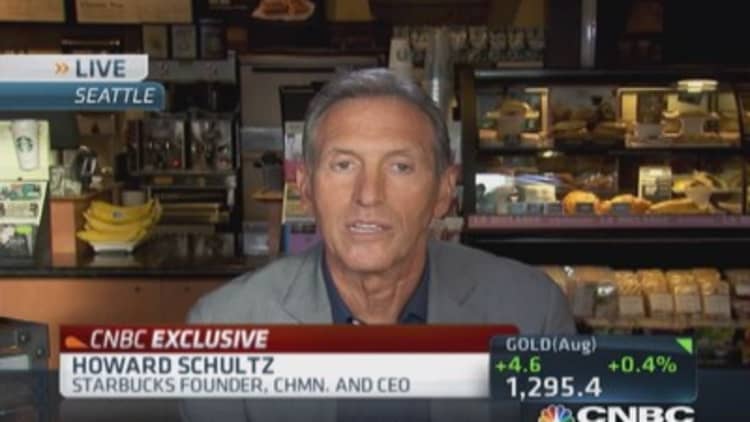
How do you say, "I'll have a light roast" in Chinese?
It's likely those very words are heard more than a few times a day in China, where Starbucks now boasts nearly 1,300 locations. After slowly building a presence in China for roughly 16 years, the company is now finally seeing real progress, CEO Howard Schultz told CNBC on Friday.
Read MoreStarbucks earnings, revenue beat Street estimates
"The real breakthrough for us is our core customers today are Chinese and we are beginning to breakthrough on the morning ritual," Schultz said on "Squawk on the Street." "Our success to date in China has been without the morning ritual. Once that comes, the volumes and success of the company is even going to be greater."
Starbucks' success in China can be credited to the company's culture and relationship with its employees, as well as the government, the coffee chain's top boss said.
Schultz added that business in China is by no means easy, though, calling it a "difficult nut to crack."
Earlier this week, McDonald's and KFC parent Yum! Brands apologized to customers following a food safety scare in China.
Chinese regulators shut down a local meat supplier after a TV report that showed workers picking up meat from a factory floor, as well as mixing meat beyond its expiration date with fresh meat.
Read More
Schultz wouldn't comment on the incident involving McDonald's and Yum!, except to say they're "great companies ... navigating through some tough issues."
Schultz didn't downplay the severity of what's been an ongoing issue in China either.
"Food safety is the No. 1 issue for any company doing business in China with regard to food, and we believe that we've done it the right way," he said.
Read More
Nevertheless, Starbucks' business in China is only in its "infant, infant stages, Schultz said. He thinks it will prove to be a growth story for some time.
—By CNBC's Drew Sandholm, with Reuters.


